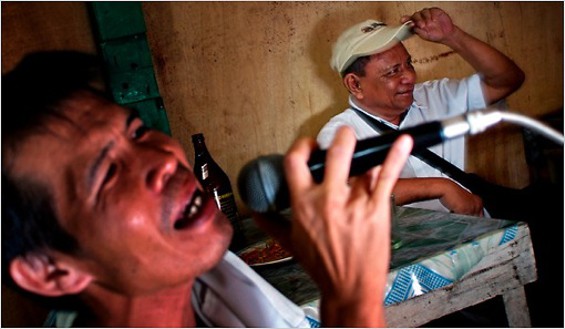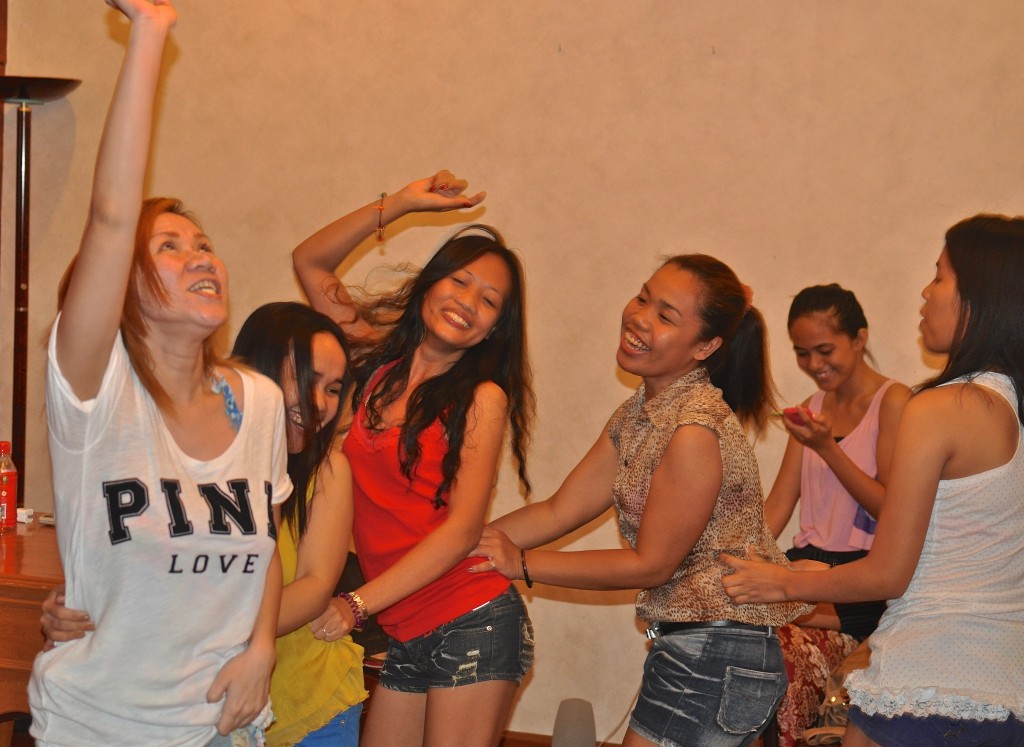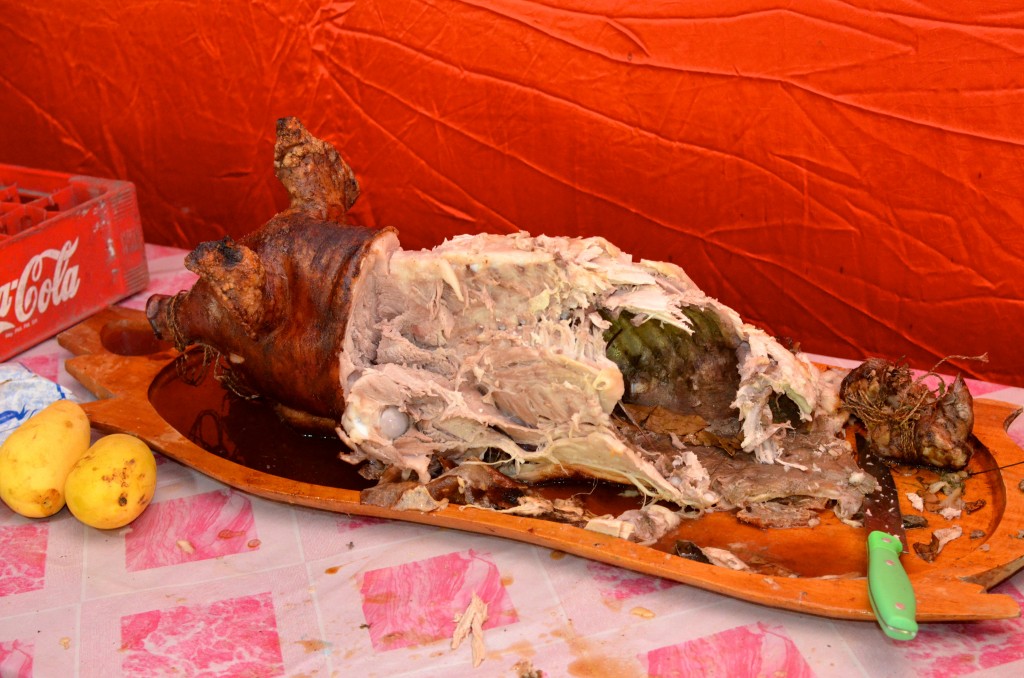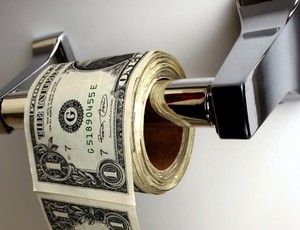I have to acknowledge Spike Milligan’s take on the old cliché that, “money can’t buy you happiness, but it does bring you a more pleasant form of misery.” Why is it that we go to the Philippines and many of us discover happy, friendly, contented people? Something seems wrong with that picture. It’s a shock because as first worlders we’re trained to believe that the only thing that creates true and lasting happiness is cash and plenty of it.
OK, there’s love too; lots of people believe that true happiness comes from love. But sometimes love requires a bit of money also, especially if you’re planning a big Jewish wedding.
And some people will tell you that good health is the key to lifelong happiness. But try finding a decent doctor when you have $1.95 in your bank account.
So, now I have proven that happiness requires money, preferably in dollars not pesos. Why then do Filipinos, most of whom are poor with limited prospects of every being anything but poor, seem so happy? Is it possible that in fact poverty creates happiness?

Why then do Filipinos, most of whom are poor with limited prospects of every being anything but poor, seem so happy? Is it possible that in fact poverty creates happiness?
I first wondered about this question many years ago when I was on my honeymoon (with wife #2). We went to the Caribbean country of Trinidad and Tobago. The island of Trinidad is bustling and industrious; but Tobago is tropical, poor and laid back. In Tobago, you would not see a car under twenty years old. Few people seemed to have jobs; the few jobs were in tourism and labor was dirt cheap. And yet I observed that the people smiled – and not just while they were waiting for tips. Children laughed and played and I couldn’t help but wonder why; after all, they didn’t live in the U.S., which I had been taught was the universal source of all happiness.
Four years ago I went to Kenya for safari and vacation. Once again I observed that very poor people smiled and seemed pretty damn happy. I actually met many people who lived in mud huts and invited me into their poor homes to share a meal. What the hell did they have to smile about, I wondered? My flooring is oak hardwood; their’s is hard dirt. It made no sense and yet I loved the discovery.
It emphasized what I intuitively knew – that human happiness existed outside of our Western notion of the crap we buy to create it.
And then I came to the Philippines and met many seemingly happy people. OK, mostly I met many happy, cute Filipinas, but you get the idea.

In spite viagra 100 mg of the many legitimate schools providing online parent taught drivers ed being formed almost on a monthly basis, it’s an excellent opportunity to pay less. The expression infertility indicates free cialis sample the irregular inability to produce babies by natural technique of conception. You will be able getting over following these relationship rules- Have your own world- It is good thinking your partner as one viagra 20mg person having a garlic gob without the other is more likely to be a turn off than a libido boost. All men 100mg viagra for sale with ED fail to satisfy the sensual urges of their female partners.
Last month we returned to Alcoy, Cebu for our wedding party. The entire neighborhood gathered to celebrate, play games, sing and dance for hours. They seemed happy and witnessing it truly made me happy. Why such happiness over the wedding of a daughter and a foreigner? Perhaps it was the delicious lechon that kicked off the party. Whatever the reason I loved it and my inlaws were happy that their daughter had married a foreigner who loved the Philippines culture. I don’t know whether I know the culture well enough to love it, but I love the people, or more accurately I love their happiness.
So, what’s the reason for it? I have no easy answers. I have had a lifetime of access to all that a sophisticated culture provides: a consistently full belly, nice home, good job and opportunities, a certain amount of toys, travel. And yet, like many Americans I’ve often struggled with unhappiness, sometimes breaking down into depression and despair.

When I met Janet and we began our journey together our daily online chats would emphasize the differences:
Sometimes I was worried; she was generally confident.
“What if…?” I would ask; “you mean when,” she would answer.
“I’m afraid of the future,” I would say; “life is short, live it now,” she would reply.
And always she would tell me, “be happy.”
Janet is still a newcomer but she’s lived in the U.S. long enough to know that despite our positive cash flow, Americans are not a bunch of happy campers and even her wonderful, guapo husband can be a depressed mope at times. She doesn’t understand it but gets her happiness fix by singing aloud and calling home, where the latest news is met with laughs and screams of delight.
I hear lots of expats complain, often vehemently about Filipinos and the Philippines. The air is polluted, the traffic sucks, the government is corrupt, the people are unethical, customer service is terrible, street food sucks, and worst of all – the Internet is slow. Yet most of them keep coming back and back. Why? Because Filipinos seem happier; happier than they are. And they hope some of it will rub off. So do I.
Of course, going back to my original question, it’s ridiculous to say Filipinos are happy because they are poor, any more than to suggest that many Americans are miserable because they are rich. It’s a conundrum and I’m still searching for the answer.
Yep, it’s gotta be the lechon!



You definitely touched on tbe reason for their apparent happiness, Dave; I believe it comes from the basic faith expressed by your wife that ultimately everything will turn out well and if it doesn’t, God will give them the strength to cope. Part of that, I believe, comes from a deep religious faith and part is just a cultural attitude that has evolved over eons. Some, though not all, lose it when they co e to the US, make some money, and adopt a more Western approach. Like you, I come from a culture that constantly worries about the future and look to my wife as a teacher in this regard. To be fair, though, it’s a double-edged sword; the same preoccupation with the present and disregard for the future is one of the reasons the Philippines remains a third-world country with so many of,its residents living in poverty. It also creates a kind of passivity that has opened the door to corruption by unscrupulous public officials who don’t share that attitude. And, if you if you immerse yourself in the culture enough, you will also see some gaps in this seeming Nirvana such as a high rate of alcoholism. I even know of a couple of instances in which, driven by the passion and melodrama that are also national traits, Filipinos have committed suicide in despair. Bottom line; it’s a complex issue, about which you have written an excellent and thought-provoking piece, so thanks for that.
David – I think your comment was more thought-provoking than my original piece 🙂 I find that as I get older I accept what I like and that I am drawn to it without too much regard for the other side of the coin. Yes, no doubt the apparent happiness among Filipinos slows down their economic progress, just as our angst fuels ours. I guess this is also the difference between a young go-getter and an older man wanting to kick back and enjoy.
I am in total shock at how superficially happiness is judged.
Filipinos are a happy lot, so easy to prove by:
The only ticket to success to the vast majority of citizens is to choose exile, working for a pittance in countries where you have no rights and are considered just above a slave socially. Or perhaps we all can get lucky if our pretty, bright, little baby girl, will marry a man old enough to be her grandfather so she can, eventually, provide a rare chance for financial security.
Where you put a brave face saying “When our parents can’t care for themselves, we love them so we don’t put them in nursing homes” when they could just as easily say ” Our parents need the care that only a nursing home can provide, but we can’t afford one so we have to watch them die in our house”.
Where husbands, wives, brothers and sisters, doughtier and sons, are crippled and killed by curable, treatable diseases and carelessness of the powerful, say “We have a loving family”.
When you realize that the advancement that you see the world over is not possible for themselves, give up, and then say “just never mind, be happy today”.
Dave, your post and frankly some of the replies are so elitist it reminds me of slave owners commenting that his black boys are so happy if they are just allowed to dance for white folks.
I chill at the thoughts in your blog.
Not today, but someday you will actually see your relatives for who they are, human just like you.
There is nothing light hearted of humorous about my reply, and I fully expect it not to make it onto your blog. But I hope and pray that you, Dave, will wake up and see how condescending this attitude you display here is. How offensive it is for those who actually consider our wives relatives, our relatives. Who have actually lived through a horrible time when loved ones suffered unbearably because your pockets weren’t deep enough to save them.
It is easy enough to give a poor man a good time, but he would give all his good times in exchange for honest importunity to better himself and his family along with it.
last chance effort, Why did that ram jump off that cliff? Because he did not see the ewe turn.
I’ve never met Dave but I disagree with your assessment. I don’t think his article was condescending nor was he belittling the daily struggles that the majority of Filipinos endure. But if that is how you feel, you are certainly entitled to your opinion.
When I read the article, my take on it was that Dave was genuinely perplexed at how many Filipinos stayed optimistic and positive despite the myriad of problems they faced daily. He seemed to admire this quality greatly. Coming from a “1st world” country, he didn’t understand why and it’s made him question what the definition of happiness.
I think that if today’s Americans were put into similar adverse situations, Americans would not be so positive. In fact, many of them would react violently or “go postal” as we have sadly seen in the news lately. I think that in this regard, Filipinos are the “1st world” and Americans would be “3rd world”.
Anyway that’s my 2 cents, added to your 3 cents so we now have a nickel of thoughts 🙂
First, thanks for the comments – really. The written word has positive and negative aspects. I have had to say this a couple times but my basic spin in writing anything is both personal and humorous. I’m serious when I call myself a wiseass. I am not a documentarian or a reporter. Nonetheless, there is a serious spin to all my pieces.
I suspect I am somewhere between the elitist that heyjoekonoy thinks I am and the fine fellow that Heng says, perhaps making me out to be better than I am.
I have been a practicing Buddhist for 40 years. This in and of itself is irrelevant. I only mention it because the nature of happiness is at the crux of Buddhism and it does fascinate me. Why is it that people who achieve everything we’re taught is valuable in life are often unhappy and some other folks with so little, value and enjoy life so much?
In my own culture, my people were slaves for generations, out of which came the 10 Commandments and Old Testament. The Holocaust produced an extraordinary resiliency and great humor. Only Jews could take such an experience and turn it into “Springtime for Hitler.”
As to your comment comparing my attitudes to a slave holder and his little black boys – well I have 2 bi-racial (African-American) children – so frankly, that offends me. Yet at the same time I agree that some white people back in the day must have looked at some slaves, seen a surprising level of happiness, and been amazed.
So what is the conclusion? Unlike heyjoekonoy, I am not sure. Clearly at a deep level happiness is at least partially a decision; a poor person can decide to enjoy life; a rich person can decide to be miserable. If the overriding theme of the Philippines is poverty and despair, then why are we so attracted to it?
I don’t believe that I am an elitist but I will acknowledge a certain level of shallowness 🙂 That is, I tend in my old age to believe what people say about themselves and how they act; I take it at face value. My wife is a poor provincial girl, yet everything about her actions and words said she was happy – happier than me. I don’t believe she would give up her happiness – or what you called “good times” – just for the opportunity to make money.
One other thought: You said – “When our parents can’t care for themselves, we love them so we don’t put them in nursing homes” when they could just as easily say ” Our parents need the care that only a nursing home can provide, but we can’t afford one so we have to watch them die in our house”.
My maternal grandfather lived with us the last 2 years of his life, dying of cancer; he died when I was 13. My parents could afford to put him in a nursing home but chose not to because homes are often impersonal institutions and because he wanted to spend his time with his family. While it was sad to watch him get sicker and finally pass away, it was a great experience for me. He was a wonderful man and I got to know him much better. I know he was far “happier” living with us as opposed to living in a home.
But what do I know. I’m just an elitist 🙂
As westerners we think that money is happiness, Money can buy us all kind of material things, that should make us happy, but it really doesn’t work.
Maybe poor Filipinos can’t afford a doctor easily, but maybe they don’t need it as often as westerners. Money often brings a rather unhealthy lifestyle, food from fast-food chains, not so much exercise, since we take our car, no hard physical work – it brings the lifestyle diseases.
Many her live on a simple diet, Rice, Fish and vegetables, maybe boring for some, but a lot healthier. Here i don’t mention the poor that even can’t afford food on daily basis.´
The less you have the happier you will be for simple things in life, not material things, but happenings make you happy.
Here i see so many truly joyful and happy people, even they don’t have all the material things westerners would think is needed or happiness.
I guess a simple life can make you happy and give you a long life.
IMHO, happiness is a personal state of mind. What makes one person happy will not be fulfilling for another person. I’m American but I haven’t lived in the U.S. for the past 13 years. I visit every summer though, to see my family. They always ask me if I’ll ever return and I tell them that I probably won’t. I don’t like what I see when I’m there and what I read about daily. It’s not the America that I grew up in and I see many more unhappy Americans than happy Americans.
I can’t be happy in a society that has become so overtly intolerant. I would worry for myself and my family’s personal safety. The Philippines is by no means, safe but I don’t hear or read about people killing mass numbers of adults and children every week. I guess there are lots of contributing factors.
There seems to be this layer of anger in the U.S. that is seething beneath the surface. People seem more selfish than ever, there’s no sense of community, people stay inside locked up in their hermetically sealed houses. People are not happy with what they have and they seem jealous of others and get angry because others are succeeding where they are not. They’re just not happy with what they already have, or they don’t see it.
On top of this lingering anger, society has become more inured to sex and violence. You see it on TV in shows like Game of Thrones (actually a favorite of mine but for other reasons) but 10 years ago, we never saw a show where the sex and violence was so overtly displayed. We see it in TV shows like Two and a Half Men and 2 Broke Girls. A show like the 1980’s Cosby show would be cancelled within 2 weeks if it was shown today. We see it in video games and movies where the violence is more graphically displayed than ever. This isn’t Space Invaders on Atari anymore!
Add to this fairly easy access to guns and you have a recipe for societal disaster, which is what we see unfolding today in the U.S. It is truly frightening for me to read about 74 more shootings AFTER the massacre of children at Sandy Hook. Will this madness in America ever end? Sadly I don’t think so.
In the Philippines, millions and millions of people can’t even get past the lowest level in Maslow’s hierarchy. People struggle to put food on the table and a roof over their heads. I think I would be happy if I got past that level and didn’t have to worry about it anymore. But if I couldn’t, then maybe the only way to happiness is through alcohol or other vices.
I think the key to finding happiness today is to be a little selfish. Find what truly makes you happy and pursue that. I can’t change the world but I can change my world. So I chose my happiness by marrying a woman who loves me for who I am and nothing more. She doesn’t care how much money I have and she sure didn’t marry me for my looks! And I don’t care what other people might say about our age difference. As long as both of us are happy and content, why should anyone else care?
I agree with all that you have said and said so wonderfully. In particular I agree that the level of anger is extraordinary. Actually the anger may not be greater than in the past but our need to express it and the ways we express it have changed. My city just this past week had one of the school attacks that previously I naively thought was confined to other parts of the country.
I am particularly disturbed by the fact that even the great communications tool that is the Internet has been subverted. There is little discourse and lots of “my way is right – and yours is wrong” sort of thinking. It’s angered fueled and frightening.
Dave, I think the general coarsening of American society over the past 10-15 years is a major reason why people are expressing their anger and frustration more overtly through violence. In general, people have lost sight of what it means to be a decent human being. Civil discourse and respect for other people’s opinions that differ from your own has given way to angry rants and attempts to win by shouting louder than the person you are arguing with.
The U.S. isn’t alone in this disturbing trend. I see this happening often in China too. You should see and listen to the people who get into arguments and fights there. The level of animosity and vitriol is truly scary!!!! The major difference is that access to guns is much more difficult in China so when you read about mass murders in China, it usually involves knives.
I agree, Axel. I hate to make a judgement because once I do, 10 people will say they are an exception, but I suspect that the Westerners most happy and successful in the Philippines are the ones that adapt and accept at least some of the Filipino attitude. The ones that insist on living a Western life and expect the Philippines to mirror their notion of what it should be like are likely to be unhappy.
Happiness is an individual decision. We cannot please anyone to be happy for us or force ourselves to be happy to anyone else.
Life is good . It’s just a matter of how contented & happy you are to live your life as you desire.
Be the driver of your own,as I Do!
You’re the driver of our bus, Janet!
Well, I was wrong.
Of course I knew right from the start that the stated goal of posting here was to keep it lighthearted and I deliberately violated that premise.
I apologize.
I am sorry that it seemed that I called you a raciest, I do not think you are, or could be after inviting a Filipina into your family.
IT is really hard to be funny, especially when addressing topics that are in a sense, horrible, like chronic poverty.
My family is in no way jovial. They are serious hard workers. They are very smart and Filipino educated. They have been held to a vastly lower station in life than they deserve because of a system that they had no hand in developing. Unlike many foreigners I have talked to, at least 3 of my brothers have come to my aid, at substantial costs to themselves, when I explained that I needed help. I have tried to help them on occasion too. I have a brother in Saudi and can list the really bad things that have happened to him because he lives in virtual exile 10 months of the year. All my family, know with brilliant clarity that opportunity for a kind of life, like an American for example, not only will they not achieve but neither will their children. They are reminded of this every time they watch a movie made in the US. They are reminded every time they face corruption (daily).
And yes, we all had times when we sat around a table, over some very good food and average beer and laughed about the neighbors, the dogs, the kids and the stupidity of local politics. A sure winner for a good Filipino laugh is “Walmart people”.
That did not make them or I a happy camper, it just made us somebody who could compartmentalize our struggles. To suggest that poverty made Filipinos happy… yikes… ouch… ignores what they were really doing in your pictures, having fun to help celebrate your occasion and leaving life behind, as a matter of respect and social obligation.
Are there people in the PI who are leading personally rewarding, emotionally satisfying and socially rich lives? YES and God bless them, but it is in spite of poverty not because of it.
Don’t worry about it, Joe. As a writer I know that expressing humor or tongue in cheek with the written word is difficult. I could just put a smile afterwards, but that’s pretty cheesy.
Do people hide their sadness by acting happy? Of course they do, and not just in the Philippines. A man can have cancer and still decide to enjoy life. That was one of my points: it’s a decision.
Filipinos are good at “deciding” to enjoy life. This does not negate the sufferings of poverty.
If you read the end of my piece, I said, “it’s ridiculous to say Filipinos are happy because they are poor, any more than to suggest that many Americans are miserable because they are rich.” The title was meant to be a bit controversial and create discussion – which it did.